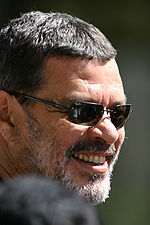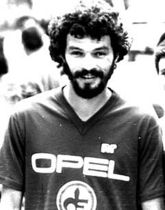Sócrates
 |
|||
| Personal information | |||
|---|---|---|---|
| Full name | Sócrates Brasileiro Sampaio de Souza Vieira de Oliveira |
||
| Date of birth | 19 February 1954 | ||
| Place of birth | Belém do Pará, Brazil | ||
| Height | 1.93 m (6 ft 4 in) | ||
| Playing position | Midfielder, Forward | ||
| Senior career* | |||
| Years | Team | Apps† | (Gls)† |
| 1974–1978 | Botafogo-SP | 57 | (24) |
| 1978–1984 | Corinthians | 297 | (172) |
| 1984–1985 | Fiorentina | 25 | (6) |
| 1986–1987 | Flamengo | 11 | (3) |
| 1988–1989 | Santos | 5 | (2) |
| 1989 | Botafogo-SP | 0 | (0) |
| 2004 | Garforth Town [1][2] | 1 | (0) |
| National team | |||
| 1979–1986 | Brazil | 60 | (22) |
| * Senior club appearances and goals counted for the domestic league only. † Appearances (Goals). |
|||
Sócrates Brasileiro Sampaio de Souza Vieira de Oliveira, MD, (born February 19, 1954 in Belém do Pará, Brazil), more commonly known simply as Sócrates, is a former Brazilian footballer. He was an excellent assister and team organiser, with great through passes and vision of the field. He was also a two-footed player, a prolific goal scorer, and has been described as the most rugged footballer of the Cold War era. His ability to read the game was highly valued, and his signature move was the blind heel pass.
Contents |
Career

Sócrates' hometown is Ribeirão Preto in São Paulo state. As one of the best midfielders in football history, Sócrates played for, and captained, Brazil in the 1982 World Cup. However, Edinho replaced him as captain for the 1986 FIFA World Cup with Socrates playing as a regular midfielder. He began playing football professionally in 1974 for Botafogo in Ribeirão Preto, but spent the majority of his career (1978 to 1984) with Corinthians in São Paulo, where he became famous for using football to challenge the existing military dictatorship. During his time there he co-founded the Corinthians Democracy movement. Sócrates and his team mates protested against the regime's treatment of footballers, and showed support to the wider movement for democratisation, by wearing shirts with 'Democracia' written on them during games.[3] Sócrates has stated that his childhood heroes were Fidel Castro, Che Guevara and John Lennon.[4]
Sócrates was capped sixty times for Brazil between May 1979 and June 1986. He also played for Italian club Fiorentina and the Brazilian clubs Flamengo and Santos towards the end of his career.
In 2004, more than a decade after retiring, Sócrates agreed to a one month player-coaching deal with Garforth Town of the Northern Counties East Football League in England.[5] He made his only appearance for the club on November 20, 2004 against Tadcaster Albion, coming on as a substitute twelve minutes from time.[6]
Pelé named him as one of the Top 125 Living Footballers in March 2004, and World Soccer named him one of 100 best footballers in history, in spite of the fact that he never won any medal at World Cups.
In October 2008, Sócrates was inducted into the Pacembu Brazilian Football Museum Hall of Fame.
He presently works as a practitioner of sports medicine in his hometown.[3]
Personal life
Sócrates lives in Ribeirão Preto with his wife and six children. He is a columnist for a number of newspapers and magazines, writing not only about sports, but also politics and economics. He frequently appears on Brazilian TV programmes as a football pundit. Sócrates is currently writing a fiction book about the 2014 World Cup in Brazil.[7]
Sócrates is a doctor of medicine, a rare achievement for a professional footballer (he is a graduate of the Faculdade de Medicina de Ribeirão Preto). Even rarer is the fact that he earned the degree while concurrently playing professional football.
He is also noted for being an intellectual, a heavy drinker and smoker, and for his height (193 cm, 6 ft 4 in). His brother Raí was a member of the Brazilian national team that won the World Cup in 1994 and played for São Paulo and for Paris St. Germain.
Myths
There is a persistent myth that Sócrates studied medicine in Dublin, and that during this time he played reserve football for University College Dublin. The rumour gained some credibility following articles in several newspapers[8][9] confirming it, in one case even citing a confirmation by a named source within the Football Association of Ireland. The story is, however, a complete fabrication and has been debunked in other newspaper articles[10][11] and denied by UCD FC[12].
Career statistics
| Club performance | League | Cup | League Cup | Continental | Total | |||||||
|---|---|---|---|---|---|---|---|---|---|---|---|---|
| Season | Club | League | Apps | Goals | Apps | Goals | Apps | Goals | Apps | Goals | Apps | Goals |
| Brazil | League | Copa do Brasil | League Cup | South America | Total | |||||||
| 1973 | Botafogo-SP | 0 | 0 | 0 | ||||||||
| 1974 | 0 | 0 | ||||||||||
| 1975 | 0 | 0 | ||||||||||
| 1976 | Série A | 19 | 5 | |||||||||
| 1977 | 16 | 9 | ||||||||||
| 1978 | 22 | 10 | ||||||||||
| 1978 | Corinthians | Série A | 0 | 0 | ||||||||
| 1979 | 0 | 0 | ||||||||||
| 1980 | Série A | 16 | 13 | |||||||||
| 1981 | 1 | 1 | ||||||||||
| 1982 | 9 | 5 | ||||||||||
| 1983 | 20 | 15 | ||||||||||
| 1984 | 13 | 7 | ||||||||||
| Italy | League | Coppa Italia | League Cup | Europe | Total | |||||||
| 1984-85 | Fiorentina | Serie A | 25 | 6 | ||||||||
| Brazil | League | Copa do Brasil | League Cup | South America | Total | |||||||
| 1985 | Flamengo | Série A | 0 | 0 | ||||||||
| 1986 | 11 | 3 | ||||||||||
| 1987 | 0 | 0 | ||||||||||
| 1988 | Santos | Série A | 5 | 2 | ||||||||
| 1989 | Botafogo-SP | 0 | 0 | |||||||||
| Total | Brazil | 132 | 70 | |||||||||
| Italy | 25 | 6 | ||||||||||
| Career total | 157 | 76 | ||||||||||
| Brazil national team | ||
|---|---|---|
| Year | Apps | Goals |
| 1979 | 6 | 5 |
| 1980 | 8 | 2 |
| 1981 | 15 | 6 |
| 1982 | 9 | 4 |
| 1983 | 8 | 2 |
| 1984 | 0 | 0 |
| 1985 | 5 | 1 |
| 1986 | 9 | 2 |
| Total | 60 | 22 |
Footnotes
- ↑ National-Football-Teams.com
- ↑ BBC.co.uk
- ↑ 3.0 3.1 Sócrates - midfielder and anti-dictatorship resister
- ↑ Andy Mitten Column: Interview with Socrates by Andy Mitten, Manchester Evening News, February 25, 2010
- ↑ Samba stars to join Garforth Town
- ↑ It was 2-2 cold for the boy from Brazil
- ↑ http://www.guardian.co.uk/theobserver/2010/jun/13/socrates-brazil-football-world-cup
- ↑ http://www.guardian.co.uk/football/2000/sep/13/newsstory.sport4
- ↑ http://www.guardian.co.uk/football/2002/jan/10/theknowledge.sport
- ↑ http://www.tribune.ie/archive/article/2006/apr/16/will-socrates-myth-ever-be-put-to-bed/
- ↑ http://www.irishtimes.com/newspaper/sport/2010/0618/1224272794749.html
- ↑ http://www.ucdsoccer.com/club/history
- ↑ :: National Football Teams ::.. Player - Socrates
External links
- Sócrates' blog
- In Appreciation of... Socrates
- Sócrates - FIFA competition record
- In Garforth
- Brazilian Football Museum Hall of Fame
- Interview in Portuguese
|
||||||||||||||||||||||||||||||||||||||||||||||||||||||||||